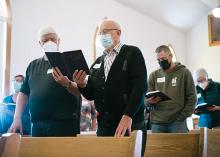Mennonite Church Saskatchewan held its 2022 annual delegate session (ADS) as a hybrid event, allowing for both in-person and virtual attendance. Delegates met at the Youth Farm Bible Camp just south of Rosthern, Sask., on March 12.
Josh Wallace, interim executive minister for MC Sask commented, “After meeting only virtually for two years, we knew folks were yearning for a chance to be together, talk together, pray together, sing together. But we were in the middle of the unmitigated Omicron [subvariant] wave in Saskatchewan. We delayed our decision about ADS until mid-February, watching the COVID numbers and hospitalization rates closely.”
He said the organizers were happy when it seemed that an in-person gathering would be a possibility, but they wanted to protect the most vulnerable people who might attend the meetings or get infected by those who had attended. “So, we chose to insist on masking (even as the public order dropped), to encourage day-of rapid testing, and to invest in a high-quality Zoom experience for folks who opted to stay home.” Fifty-eight people registered to attend the event in person while another 36 were registered for online attendance.
With the theme “Called to Here,” participants were invited to consider how to live out God’s kingdom in their home communities, with their neighbours. At the forefront of the sessions were the global neighbours in Ukraine. The morning worship time was devoted to praying for peace for Ukraine, and a special offering was taken to support Mennonite Central Committee’s Ukraine emergency response. The offering raised just over $1,000.
A portion of the business meeting that drew significant discussion concerned the three MC Sask-affiliated camps—Shekinah Retreat Centre, Camp Elim, and Youth Farm Bible Camp. Each camp has its own distinct identity and corresponding challenges.
The MC Saskatchewan Council proposed hiring an outside consultant to connect with each congregation to ask the question, “What do you think MC Sask’s camping ministry should be?” The cost for the consultation and reporting will be approximately $20,000.
A few suggestions on how to reduce the cost were offered, such as commissioning a person within the regional church to do the survey and then hiring an outside consultant to interpret the results.
Terry Stefaniuk, MC Saskatchewan moderator, said, “The camp listening and consultation process has been discussed at council for some time. The impact of events of the past two years upon congregations and camps helped us to sharpen our focus on listening and learning how to move forward in ever-changing times within society and the church. A question that needs attention is, ‘How can we as a community move forward and most effectively meet the changing needs of our community and share the words of the Bible?’”
Considering the impact of the pandemic, the regional church is in a reasonable place financially, according to Gordon Peters, MC Saskatchewan finance chair. Peters reported a deficit of approximately $24,745.
Another invitation to care for “place” came when the Ministries Commission announced the formation of a Climate Emergency Response Team. This team would help churches navigate the real, human impact on the global climate while recognizing the diverse viewpoints on the topic. The team has six action pieces in their portfolio to churches: invite prayer and fasting; provide educational materials; help with action items such as planting trees and installing solar panels; do advocacy work; engage with youth who are experiencing eco-anxiety and climate grief; and foster respectful and compassionate postures toward all people who are impacted.
“It all begins, for me, with ‘The earth is the Lord’s and all that is in it, the world, and all who live in it’,” said Claire Ewert Fisher, chair of the Ministries Commission, quoting Psalm 24:1. “For the early Anabaptist followers of Jesus Christ, this verse provided comfort and encouragement as they faced mortal death. Now it can provide us with encouragement as we face the destruction of our earth. Together we can make a difference for good.”
After two years of pandemic, when turning inward was an expression of neighbourly love, MC Saskatchewan churches now want to open up more fully to their communities once again. Preston Pouteaux, the keynote speaker for the event, summed up that idea saying, “Jesus gives us a path through hard times, like coming out of COVID, and that path leads us to our neighbours.”
This article appears in the April 4, 2022 print issue, with the headline “‘Called to Here.’” Do you have a story idea about Mennonites in Saskatchewan? Send it to Emily Summach at sk@canadianmennonite.org.
Related stories:
MC Alberta delegate sessions explore challenges and look ahead
Unity, positivity pervade MC B.C. meeting
MC Manitoba reflects on shared life together





Add new comment
Canadian Mennonite invites comments and encourages constructive discussion about our content. Actual full names (first and last) are required. Comments are moderated and may be edited. They will not appear online until approved and will be posted during business hours. Some comments may be reproduced in print.